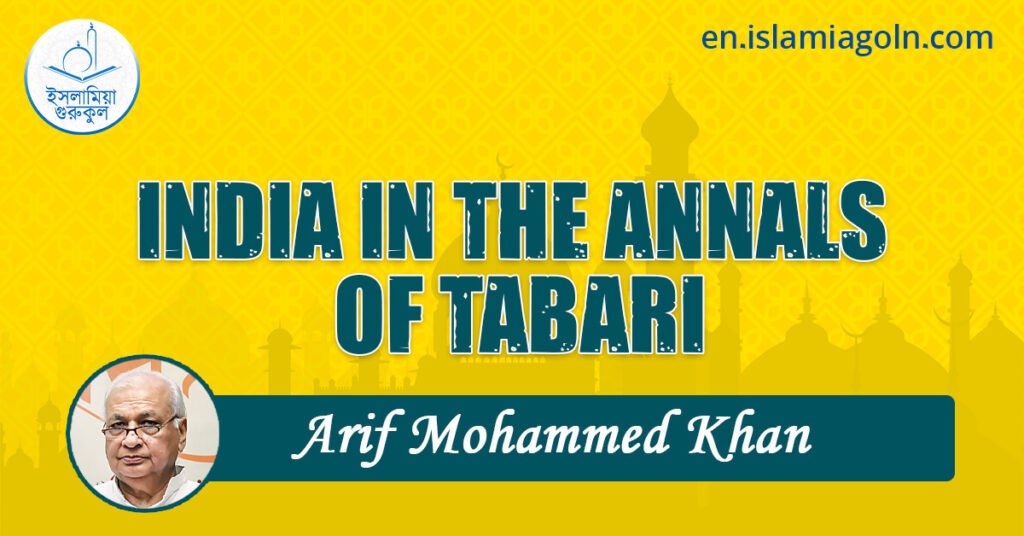Today’s Topic of Discussion: INDIA IN THE ANNALS OF TABARI
INDIA IN THE ANNALS OF TABARI
Abu Jafar Muhammad ibn Jarir al-Tabari (838-923) is acknowledged A as the first Muslim historian. He was a prolific writer who apart from subjects like a commentary on the Quran, theology, and jurisprudence has written a comprehensive book on history titled History of the Prophets and Kings’ (Tarikhur Rusul wal Muluk) popularly known as the Annals.
The Annals is a universal history giving a detailed account of the age of the prophets, patriarchs and kings followed by the Arab history and the age of Islam to the year 915. Since Tabari was trained as a scholar of prophetic traditions (Muhaddith). he has adopted the same methodology in writing history. This is borne out by his meticulous adherence to the identification of his sources and quoting two or more conflicting reports on the same event
The chapter that deals with the history of Prophets and the story of the creation of the universe and mankind is mostly based on the verses of Quran, prophetic traditions (Ahadith) and the Jewish stories known in Muslim tradition as Israeliat. It is interesting to note that in this chapter, Tabari has devoted considerable space to India, describing the beneficence and munificence of the land in most laudatory terms.
While discussing the expulsion of Adam and Eve from Paradise. Tabri quotes famous Islamic scholar and cousin of the holy Prophet, Ibn Abbas saying that after tasting the forbidden fruit the first man was sent to the earth and his place of descent was India. He quotes another narrator of prophetic traditions, Abul Alia to endorse the statement of Ibn Abbas. Taban further reports the statement of Maula Ali saying that of all the lands on earth, India has the best seasons and climate. For this reason, Adam was sent by God to India and the flora and fauna of India was blessed with the fragrance of paradise.
Tabari quotes several narrators to identify the exact place of descent of Adam and Eve. According to Ibn Abbas, Adam descended at a place known by the name of ‘Booz’ and Ibn Ishaq the biographer of the Prophet says that the place was a small mountain known as ‘Wasam’ located near the valley of ‘Bheel’ close to two cities of ‘Dhanj’ and ‘Mandal’ while Eve descended at Jidda in the Arabian peninsula.
Tabari has quoted another narration saying that Adam proceeded from India to the House of God at Makka to perform the Hajj and found Eve at the place of Arafat Together they came back to India and built a cave dwelling to start their family life The first apparel they used to cover themselves was made from the wool of the sheep that was part of the eight pairs of animals that were given to them at the time of their descent.
Tabari reports one narration of Ibn Umar saying ‘when Adam descended on the earth, he was wearing a crown of paradise leaves. These leaves dried up after some time and fell on earth and gave birth to all kinds of herbs, fruits, and crops’ The statement of Ibn Umar is endorsed by other scholars who refer to a Quranic verse ‘when they tasted of the tree, their shame became manifest to them, and they began to sew together the leaves of the garden over their bodies (7.22)
In another narration, Ibn Abbas says that before expulsion from paradise, the angels made fun of Adam. The Lord God told angels not to harass him and allow him to carry with him all the heavenly gifts that he desired. Adam brought these articles to India and now they grow all over the land. Ibn Abbas has used word ‘pure’ for the products of India and describes them as the heavenly legacy of Adam.
had The accounts of Tabari clearly show that the early Muslim scholars great admiration and fascination for India. Their description of India as the land of excellent climates, sweet fragrances and pure heavenly products sounds like a moving patriotic song. But it need not sound strange as the Holy Prophet himself is reported to have said that ‘I feel the breeze of knowledge coming from the land of India’.
See more:

